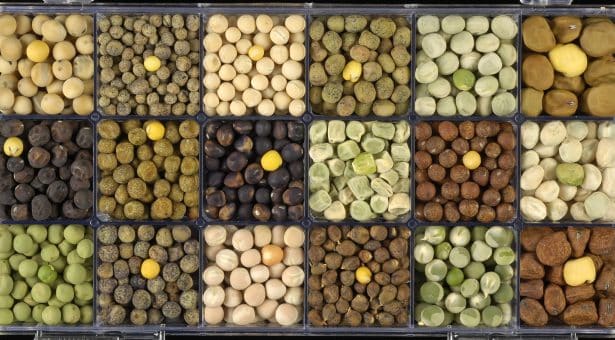A consortium of four UK research organizations, led by the John Innes Centre, has secured £3 million in DEFRA funding to advance the development of climate-resilient legume crops.
The Pulse Crop Genetic Improvement Network (PCGIN), which has been active since 2008, will benefit from this funding over the next five years, according to a press release.
The grant will support PCGIN-affiliated researchers and its stakeholder network in achieving their goal: to provide enhanced breeding material for cultivating peas, beans, and other pulses in the UK.
Pulse crops serve as a crucial source of alternative protein and enhance soil health in rotation schemes by reducing the need for nitrogen fertilizers.
The research will tackle both existing and emerging threats from pests and diseases, such as root rot in peas and bruchid beetles in faba beans. It will also focus on improving nutritional traits, including protein content, mineral levels, and flavor components.
“Over the past 17 years, PCGIN has significantly advanced the development of peas and faba beans, with these improvements nearing market readiness. In this new phase of funding, we will extend our research to lentils and common beans, which could potentially be cultivated more extensively in the UK as temperatures rise,” Professor Janneke Balk, group leader at the John Innes Centre and co-lead of PCGIN said.
PCGIN, spearheaded by the John Innes Centre, is partnering with the University of Reading, NIAB in Cambridge, the Institute of Biological, Environmental and Rural Sciences (IBERS) at Aberystwyth University, and PGRO (Processors and Growers Research Organisation) in Peterborough.
The consortium will explore the future impacts of climate change on UK pulse crops using Met Office models. Alongside traditional genetic improvements, the project will advance gene editing techniques for pea and faba bean.
Dr. Sanu Arora, group leader at the John Innes Centre and co-lead of PCGIN, emphasized, “The next five years are crucial for developing new pulse crops for the UK. It’s essential that we collaborate closely with farmers and growers to ensure our research addresses the traits they need in their fields.”
Climate change presents a significant threat to agriculture worldwide, including in the UK. Legumes, such as peas, beans, and lentils, offer substantial environmental benefits by fixing nitrogen from the air with the help of symbiotic soil bacteria. This process reduces the need for synthetic nitrogen fertilizers, which are harmful to biodiversity and contribute to greenhouse gas emissions.
Nearly half of the protein in the human diet comes from plant sources, predominantly pulses. However, plant-based proteins differ from animal proteins and may lack some essential amino acids. By understanding the genetic basis of protein variation, we can breed better varieties with enhanced nutritional content or properties suitable for plant-based meat alternatives.
PCGIN will focus on gene-editing techniques for pea and faba bean to accelerate genetic improvements and develop new genetic resources. This initiative will also explore the cultivation of lentils and Phaseolus (baked beans) in the UK, addressing key questions such as the types of genetic variation needed to ensure resistance to local pests and diseases.











